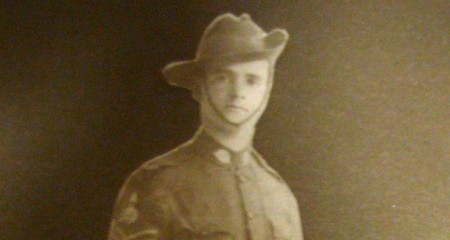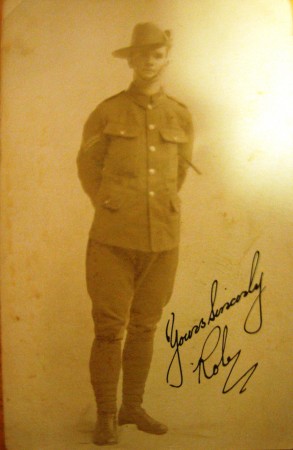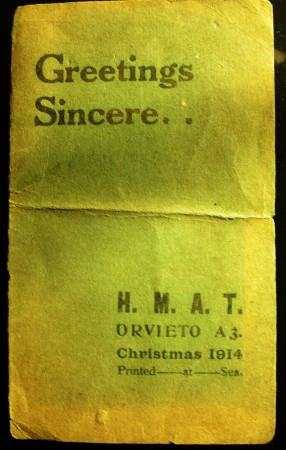WWI Stories – Robert Bryant
Robin Lee tells the story of her grandfather Robert Bryant and describes how war has touched so many in her family.
 War was no stranger to the family – before World War One, my great-grandfather was a member of the Suffolk Regiment and saw service in the Boer War, Burma and Egypt as a mounted soldier
War was no stranger to the family – before World War One, my great-grandfather was a member of the Suffolk Regiment and saw service in the Boer War, Burma and Egypt as a mounted soldier
My grandfather Robert Bryant, whose service number was 28 (he enlisted on the first day at age 19), sailed on the HMAT Orvieto.
He landed on the beach at Gallipoli at dawn on the 25th and was wounded later in the day. He was sent back to Gallipoli, fought at the battle of Lone Pine and remained for another 4 or 5 months before suffering severe gastro-entertis, common among the soldiers living in such dreadful conditions for so long.
Back in London, as he recovered, he met a young English woman Ada and at the age of 21 they married. Due to his service and injuries, grandfather was not sent back to Turkey or to France (where his brother Alf won a Military Medal for bravery under fire). Instead, he was posted to the fledgling ANZAC Provost Corps, Australia’s first military police force, at Tidsworth UK.
Grandfather survived the war and returned to Melbourne, his wife and baby girl (my grandmother and aunt) arrived later on a war bride ship. My father, of the same name, was born a year later in 1920. I am lucky enough to have mementos of grandfather’s service – his lucky 1914 shilling that he carried throughout his service, his Gallipoli pay book, his medals and the New Testament he was given by a British soldier in Cairo when they were at Mena Camp. Sadly, grandfather died at the age of 50, on the steps of Flinders Street Station from a heart attack.
Grandfather’s brother Alfred Bryant also fought at Gallipoli, although was not at the landing on April 25th. Alf went on to fight on the Western Front and won a Military Medal for bravery under fire in the Somme, near a small town called Lahors. My mother’s grandfather Major Armadale Charles Anderson from Tasmania also fought in the Somme and was mentioned in despatches for bravery. They and other family members who fought in WWI all came back – our family was very lucky.
Grandfather’s daughter, my aunt Marjorie, is 96 now and lives in Canberra. She is very fit and well and may very well be one of the few surviving first descendants of a Gallipoli veteran in Australia.
 As for my father – he joined up at the outbreak of WWII and quickly achieved the rank of Lieutenant at the young age of 20. He was promoted to Captain when he was 21, in the Middle East, apparently the youngest Australian officer to be made a Captain. He was quickly promoted to Major and saw service in the Middle East and then New Guinea.
As for my father – he joined up at the outbreak of WWII and quickly achieved the rank of Lieutenant at the young age of 20. He was promoted to Captain when he was 21, in the Middle East, apparently the youngest Australian officer to be made a Captain. He was quickly promoted to Major and saw service in the Middle East and then New Guinea.
Father then joined the British Commonwealth Occupied Forces in Japan, and has some most interesting memorabilia and photos from there, around Hiroshima and Kobe particularly. At one stage he was on ship which called in to a Russian port and was accused by the Russians of spying. It made the news in Australia and almost caused a diplomatic incident.
From Japan he went to Korea and was based at Headquarters during the Korean War. Amongst a swathe of medals he also holds a US Presidential citation for his service in Korea.
After the war he was posted to the Territory of Papua New Guinea in a military posting as Government Secretary to the Administrator, Sir Donald Cleland. By 1964 PNG was being guided towards Independence and my father was appointed as the first Chief Electoral Commissioner, tasked with developing and implementing the electoral system for the country.






